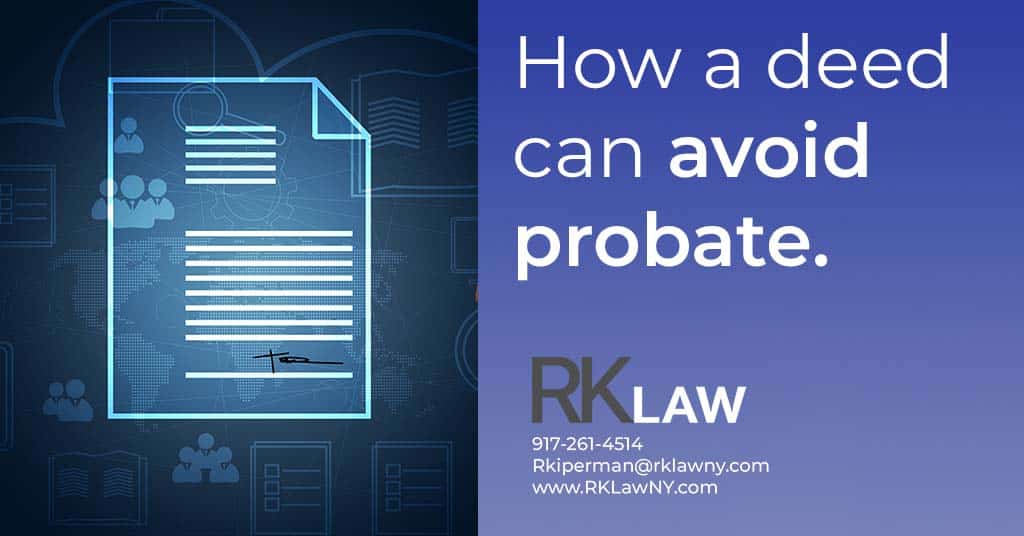How Deeds Can Avoid Probate
Did you know that Deeds Can Avoid Probate? Indeed, real estate deeds are an excellent way to engage in estate planning.
Let’s take the example of Alice and Bill. They live in Brooklyn. They are about to purchase their first home. Understanding how expensive the Brooklyn real estate market is, Alice’s mother, Cathy, is going to contribute some money towards the purchase of the property. Cathy wants to be considered a fractional owner but also wants to make sure that the property seamlessly passes to Alice and Bill following Cathy’s death. She has heard that titled property, deeds can avoid probate. How can the deed be titled to both preserve the mother’s rights and avoid probate?
What are Different Ways of Holding Property?
There are a number of different ways to hold property. EPTL 6-2.2 sets forth how property is interpreted to be held in the absence of additional language in the deed. Note that not every way of holding property will avoid probate.
Tenants in Common
The first way to hold property is as “tenants in common.” Tenants in Common are considered to own their share of the property and be responsible for all costs of their pro rata share. When a tenant in common dies, that person’s share passes via that person’s estate. Thus, holding property as Tenants in Common does not avoid probate. On the contrary, following the death of a tenant in common, the heirs of that owner may have to either Probate the deceased’s owner’s Will or Administer his/her estate to take charge of their share of the house.
If a person has a Last Will and Testament, then the property will pass pursuant to that Will. However, if the property was transferred into a Trust, then the asset will pass pursuant to the terms of the Trust. If a person dies without a Will then the property will pass in accordance with the laws of intestacy (or, in New York, pursuant to Estates Powers and Trusts Law Section 4-1.1). The estate of a person who holds property as a tenant in common will then have to determine what needs to be done, including whether they need Court approval to sell.
A tenancy in common may be the optimal way for two parties who have different remainder beneficiaries to hold property. However, this way of holding property may not be ideal for those parties desiring to pass their property to the same person, or, those trying to avoid probate (click here to learn more.)
Joint Tenants
Another way to hold property is as Joint Tenants. Joint tenants each own the full share of the property. Upon the death of one tenant, the second tenant automatically succeeds to the deceased tenant’s ownership interest in the property. There is no need to probate.
Deeds Can Avoid Probate – Life Estate Deed
What about Cathy? How can Cathy’s contribution to the property be reflected in the deed? Can Cathy be given a “life estate”?
A life estate is only available during a person’s lifetime. During life, the other parties cannot sell or do anything to the property without the consent of the life estate holder. Upon the death of the life estate holder, the life estate is extinguished and the property passes by operation of law to the other individuals designated as owners on the deed.
Other Uses For Life Estate Deeds
Life estate deeds can be used not only for estate planning, but also for medicaid planning as well. Indeed, sometimes, using a life estate deed can avoid having to prepare a medicaid trust. (For medicaid planning, a parent can transfer their home to their children and reserve for themselves only a life estate. This will allow the parent to continue to have legal rights to the property during life time. If they are able to transfer the property and then avoid entering the nursing home for 5 years, then the transfer will be exempt. In addition, upon death, the life estate is extinguished, the child receives a step up in cost basis, and there is no need to probate or administer an estate.
In our case, what’s the best option for Alice, Bill, and Cathy? Under these circumstances, a joint tenancy deed with a life estate for Cathy will best serve their needs without the need for any other estate planning documents. Thus, deeds can avoid probate.
Additional resources provided by the author
For more information, please contact NYC Probate Litigation, Guardianship, NYC Probate and Estate Planning attorney Regina Kiperman:
Phone: 917-261-4514
Fax: 929-556-2089
Email: rkiperman@rklawny.com
Or visit her at:
40 Wall Street
Suite 2508
New York, NY 10005
Visit Regina on LinkedIn
Visit Regina on Facebook
This page is made available by the lawyer for educational purposes only as well as to give you general information and a general understanding of the law, not to provide specific legal advice. By using this site you understand that there is no attorney client relationship between you and the lawyer. The post should not be used as a substitute for competent legal advice from a licensed professional attorney in your state. ATTORNEY ADVERTISING.
